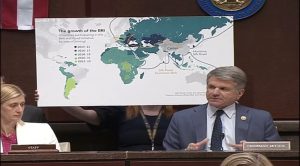Chairman McCaul Delivers Opening Remarks at Hearing Assessing U.S. Efforts to Counter CCP’s Belt and Road Diplomacy
Washington, D.C. – Yesterday, House Foreign Affairs Committee Chairman Michael McCaul gave the following remarks at a full committee hearing on assessing U.S. efforts to counter China’s Coercive Belt and Road Diplomacy.
-Remarks as delivered-
There is no denying the threat from the Chinese Communist Party is real. The tentacles of the CCP reach every corner of the globe as they continue to pull nations into their sphere of influence.
Just this past week we learned of a Chinese spy station located 100 miles off the coast of Florida in Havana, Cuba.
China’s malign influence is growing exponentially, and its encroachment into the Western Hemisphere poses a clear and present danger.
Now is the time to act and address this with the seriousness it deserves.
We need a whole-of-government approach, including a concerted effort among the State Department, the Commerce Department, and the Development Finance Corporation to successfully counter the CCP’s Belt and Road Initiative.
The BRI seeks to develop a system of PRC-controlled infrastructure, energy, transportation, trade, and production networks across the globe. The BRI initiative encompasses over 150 nations, with a significant focus across Africa and the Indo-Pacific with a growing focus on Latin America, the Caribbean and even Europe.
This debt trap diplomacy is saddling developing countries with unsustainable debt which China then leverages into increasing its influence.
BRI initiatives often lock countries into reliance on PRC systems, leaving countries vulnerable to exploitation by the PRC.
Specifically, the PRC uses its investments across strategic sectors to secure PRC exclusive, or near-exclusive access to and control over “dual-use” infrastructure and programs that can be used in conjunction with the PRC’s military-civil fusion program to help the PRC project coercive power into critical global regions.
Some projects include:
- 85% of Hungary’s largest ever infrastructure project, a $1.9 billion railway link to Serbia, will be financed with a loan from China’s Export/Import Bank.
- Huawei has constructed up to 70% of Africa’s information technology 4G infrastructure, including telecom, national, and government networks, which have been used for surveillance of opposition leaders.
While China has focused on consolidating power, we have prioritized:
- $100 billion climate fund to “help developing countries transition to clean energy and strengthen their climate resilience,”
- Offering Palestinians $100K to promote diversity, equity and inclusion in arts and sports, and
- A State Department grant of $20,600 for drag shows in Ecuador.
How are we supposed to lead when this administration prioritizes “green” projects and social issues, rather than applying our resources to counter the malign influence of the CCP?
This must change.
I want to refer to a Wall Street Journal Article that was written by the President of Uganda, and it’s entitled, “Solar and wind force poverty on Africa.” He says, “Africa can’t sacrifice its future prosperity for western climate goals.
The DFC was created, and I was part of it, to counter the CCP’s BRI and advance the U.S.’s security interests and transition countries from aid to trade through strategic development investments.
We must make it clear that our assistance is designed to build bridges to prosperity.
Additionally, the Foreign Commercial Service is prioritizing developed nations.
We have 22 officers in Paris, but only 12 in all of Africa. We are not showing up in Africa – and they tell me that repeatedly- and we need to be on the ground and [in] the field, working to counter BRI and the CCP’s influence.
That was the intent of Congress. Not to advance some social gender, some environmental, but to advance private investment to counter China’s aggression.
And look at this map. All of the green and blue are projects throughout the globe, spanning across Asia into Europe and Africa and Latin America – over 150 countries [now participating in the CCP’s Belt and Road Initiative.]
For every nation FCS is involved in, the CCP doesn’t just have a footprint, but a regional stranglehold as the FCS is woefully outnumbered – and so is the DFC.
Regions where the CCP, but the FCS is not engaged, are rife with opportunities for U.S. businesses.
U.S. investment will further embolden our relations and strengthen these economies on an array of industrial areas, including and importantly critical minerals.
I find it startling that China controls the vast majority of global critical minerals refining. It refines 68% of nickel globally, 40% of copper, 59% of lithium, and 73% of cobalt.
If China controls the global supply of critical minerals, it will give them an edge in the development of advanced technology.
And, following the deadly withdrawal of Afghanistan, China is moving in quickly. The CCP inked a 25-year-long contract to extract oil and are negotiating a deal for access to lithium reserves that could be worth up to $1 trillion.
They’re also looking, now, consistent with Belt and Road practices, it is feasible that China could take over Bagram Airbase, increasing their global presence and their ability to project power.
After 20 years of blood, treasure, and sacrifice, this is how it ended. This is the administration’s greatest failure.
We cannot remain reliant on China and must prioritize developing our own supply chains where we are not reliant on our greatest adversary, the Chinese Communist Party. Let’s get back to the intent of Congress and what Congress intended to get Private American investment to compete against Communist China.
###
